Entrepreneurship & Small Business Management: UK Economy Report
VerifiedAdded on 2020/12/10
|14
|3155
|139
Report
AI Summary
This report provides a comprehensive analysis of entrepreneurship and small business management, focusing on their impact on the UK economy. It begins by exploring different types of entrepreneurial ventures, including small business entrepreneurship, scalable start-ups, large company entrepreneurship, and social entrepreneurship, while also differentiating between serial entrepreneurs, intrapreneurs, and owner-managers. The report then examines the impact of small-scale enterprises on the UK economy, supported by data and statistics, and discusses the role of the social economy and start-ups in driving growth and development. It highlights the differences between small, medium, and large businesses and their respective impacts on the local, regional, national, and international levels of the economy. Furthermore, the report delves into the characteristics, traits, skills, and motivational drivers of successful entrepreneurs, differentiating them from business managers, and analyzes the environments that foster or hinder entrepreneurship. The report concludes by emphasizing the importance of entrepreneurial ventures in contributing to the UK's economic growth and innovation, and by highlighting the role of platforms like Desklib in providing resources for students and professionals in the field.

Entrepreneurship and
Small Business
Management
Small Business
Management
Paraphrase This Document
Need a fresh take? Get an instant paraphrase of this document with our AI Paraphraser
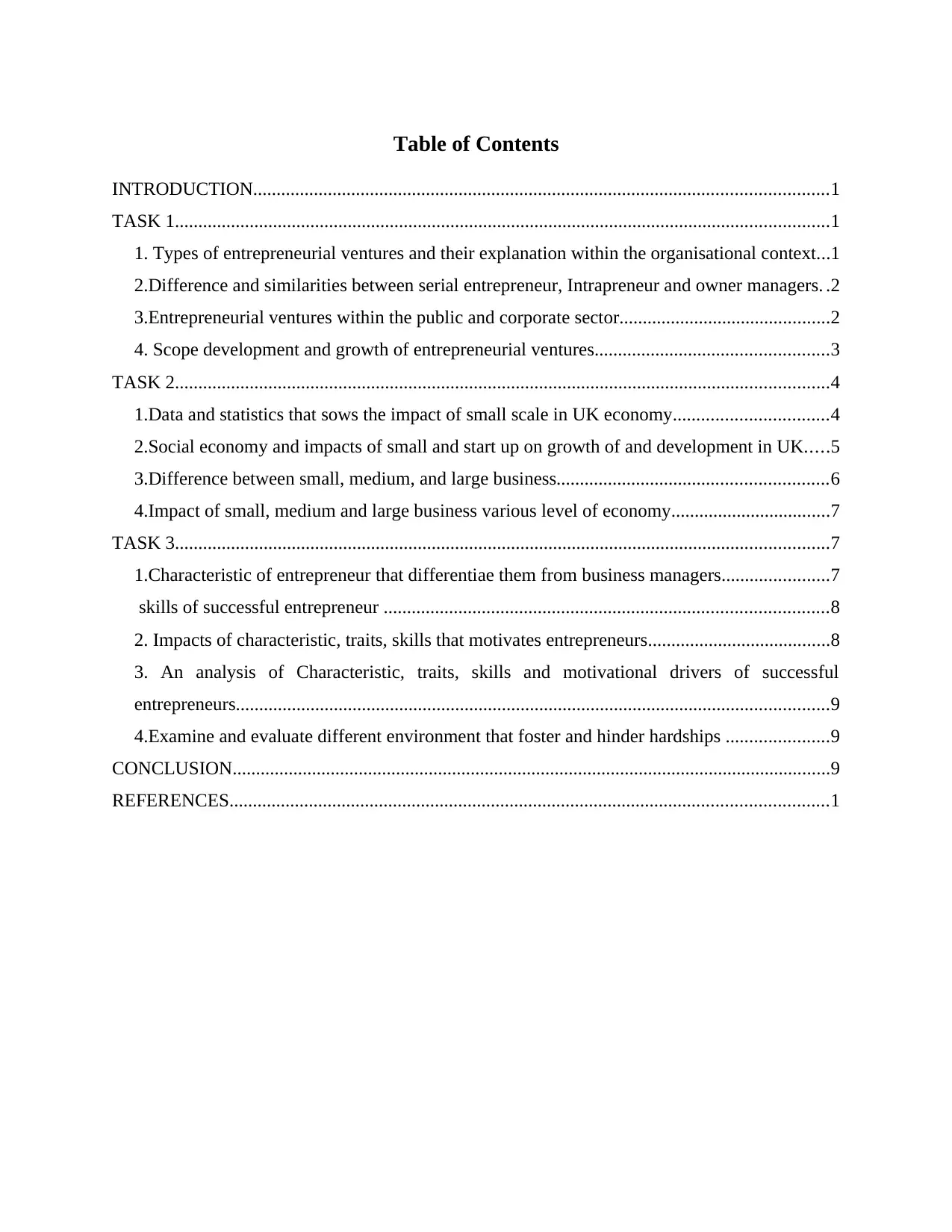
Table of Contents
INTRODUCTION...........................................................................................................................1
TASK 1............................................................................................................................................1
1. Types of entrepreneurial ventures and their explanation within the organisational context...1
2.Difference and similarities between serial entrepreneur, Intrapreneur and owner managers. .2
3.Entrepreneurial ventures within the public and corporate sector.............................................2
4. Scope development and growth of entrepreneurial ventures..................................................3
TASK 2............................................................................................................................................4
1.Data and statistics that sows the impact of small scale in UK economy.................................4
2.Social economy and impacts of small and start up on growth of and development in UK.....5
3.Difference between small, medium, and large business..........................................................6
4.Impact of small, medium and large business various level of economy..................................7
TASK 3............................................................................................................................................7
1.Characteristic of entrepreneur that differentiae them from business managers.......................7
skills of successful entrepreneur ...............................................................................................8
2. Impacts of characteristic, traits, skills that motivates entrepreneurs.......................................8
3. An analysis of Characteristic, traits, skills and motivational drivers of successful
entrepreneurs...............................................................................................................................9
4.Examine and evaluate different environment that foster and hinder hardships ......................9
CONCLUSION................................................................................................................................9
REFERENCES................................................................................................................................1
INTRODUCTION...........................................................................................................................1
TASK 1............................................................................................................................................1
1. Types of entrepreneurial ventures and their explanation within the organisational context...1
2.Difference and similarities between serial entrepreneur, Intrapreneur and owner managers. .2
3.Entrepreneurial ventures within the public and corporate sector.............................................2
4. Scope development and growth of entrepreneurial ventures..................................................3
TASK 2............................................................................................................................................4
1.Data and statistics that sows the impact of small scale in UK economy.................................4
2.Social economy and impacts of small and start up on growth of and development in UK.....5
3.Difference between small, medium, and large business..........................................................6
4.Impact of small, medium and large business various level of economy..................................7
TASK 3............................................................................................................................................7
1.Characteristic of entrepreneur that differentiae them from business managers.......................7
skills of successful entrepreneur ...............................................................................................8
2. Impacts of characteristic, traits, skills that motivates entrepreneurs.......................................8
3. An analysis of Characteristic, traits, skills and motivational drivers of successful
entrepreneurs...............................................................................................................................9
4.Examine and evaluate different environment that foster and hinder hardships ......................9
CONCLUSION................................................................................................................................9
REFERENCES................................................................................................................................1
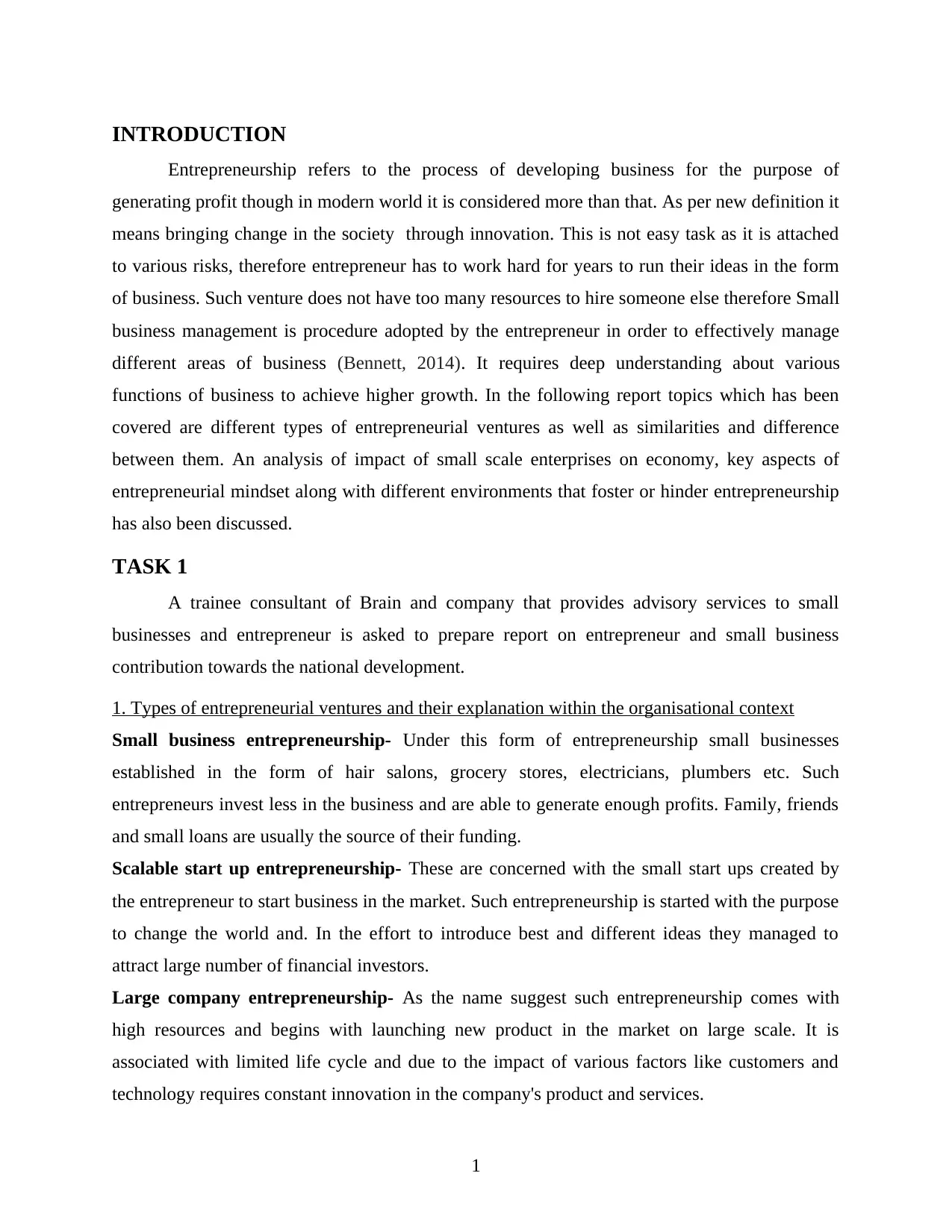
INTRODUCTION
Entrepreneurship refers to the process of developing business for the purpose of
generating profit though in modern world it is considered more than that. As per new definition it
means bringing change in the society through innovation. This is not easy task as it is attached
to various risks, therefore entrepreneur has to work hard for years to run their ideas in the form
of business. Such venture does not have too many resources to hire someone else therefore Small
business management is procedure adopted by the entrepreneur in order to effectively manage
different areas of business (Bennett, 2014). It requires deep understanding about various
functions of business to achieve higher growth. In the following report topics which has been
covered are different types of entrepreneurial ventures as well as similarities and difference
between them. An analysis of impact of small scale enterprises on economy, key aspects of
entrepreneurial mindset along with different environments that foster or hinder entrepreneurship
has also been discussed.
TASK 1
A trainee consultant of Brain and company that provides advisory services to small
businesses and entrepreneur is asked to prepare report on entrepreneur and small business
contribution towards the national development.
1. Types of entrepreneurial ventures and their explanation within the organisational context
Small business entrepreneurship- Under this form of entrepreneurship small businesses
established in the form of hair salons, grocery stores, electricians, plumbers etc. Such
entrepreneurs invest less in the business and are able to generate enough profits. Family, friends
and small loans are usually the source of their funding.
Scalable start up entrepreneurship- These are concerned with the small start ups created by
the entrepreneur to start business in the market. Such entrepreneurship is started with the purpose
to change the world and. In the effort to introduce best and different ideas they managed to
attract large number of financial investors.
Large company entrepreneurship- As the name suggest such entrepreneurship comes with
high resources and begins with launching new product in the market on large scale. It is
associated with limited life cycle and due to the impact of various factors like customers and
technology requires constant innovation in the company's product and services.
1
Entrepreneurship refers to the process of developing business for the purpose of
generating profit though in modern world it is considered more than that. As per new definition it
means bringing change in the society through innovation. This is not easy task as it is attached
to various risks, therefore entrepreneur has to work hard for years to run their ideas in the form
of business. Such venture does not have too many resources to hire someone else therefore Small
business management is procedure adopted by the entrepreneur in order to effectively manage
different areas of business (Bennett, 2014). It requires deep understanding about various
functions of business to achieve higher growth. In the following report topics which has been
covered are different types of entrepreneurial ventures as well as similarities and difference
between them. An analysis of impact of small scale enterprises on economy, key aspects of
entrepreneurial mindset along with different environments that foster or hinder entrepreneurship
has also been discussed.
TASK 1
A trainee consultant of Brain and company that provides advisory services to small
businesses and entrepreneur is asked to prepare report on entrepreneur and small business
contribution towards the national development.
1. Types of entrepreneurial ventures and their explanation within the organisational context
Small business entrepreneurship- Under this form of entrepreneurship small businesses
established in the form of hair salons, grocery stores, electricians, plumbers etc. Such
entrepreneurs invest less in the business and are able to generate enough profits. Family, friends
and small loans are usually the source of their funding.
Scalable start up entrepreneurship- These are concerned with the small start ups created by
the entrepreneur to start business in the market. Such entrepreneurship is started with the purpose
to change the world and. In the effort to introduce best and different ideas they managed to
attract large number of financial investors.
Large company entrepreneurship- As the name suggest such entrepreneurship comes with
high resources and begins with launching new product in the market on large scale. It is
associated with limited life cycle and due to the impact of various factors like customers and
technology requires constant innovation in the company's product and services.
1
⊘ This is a preview!⊘
Do you want full access?
Subscribe today to unlock all pages.

Trusted by 1+ million students worldwide
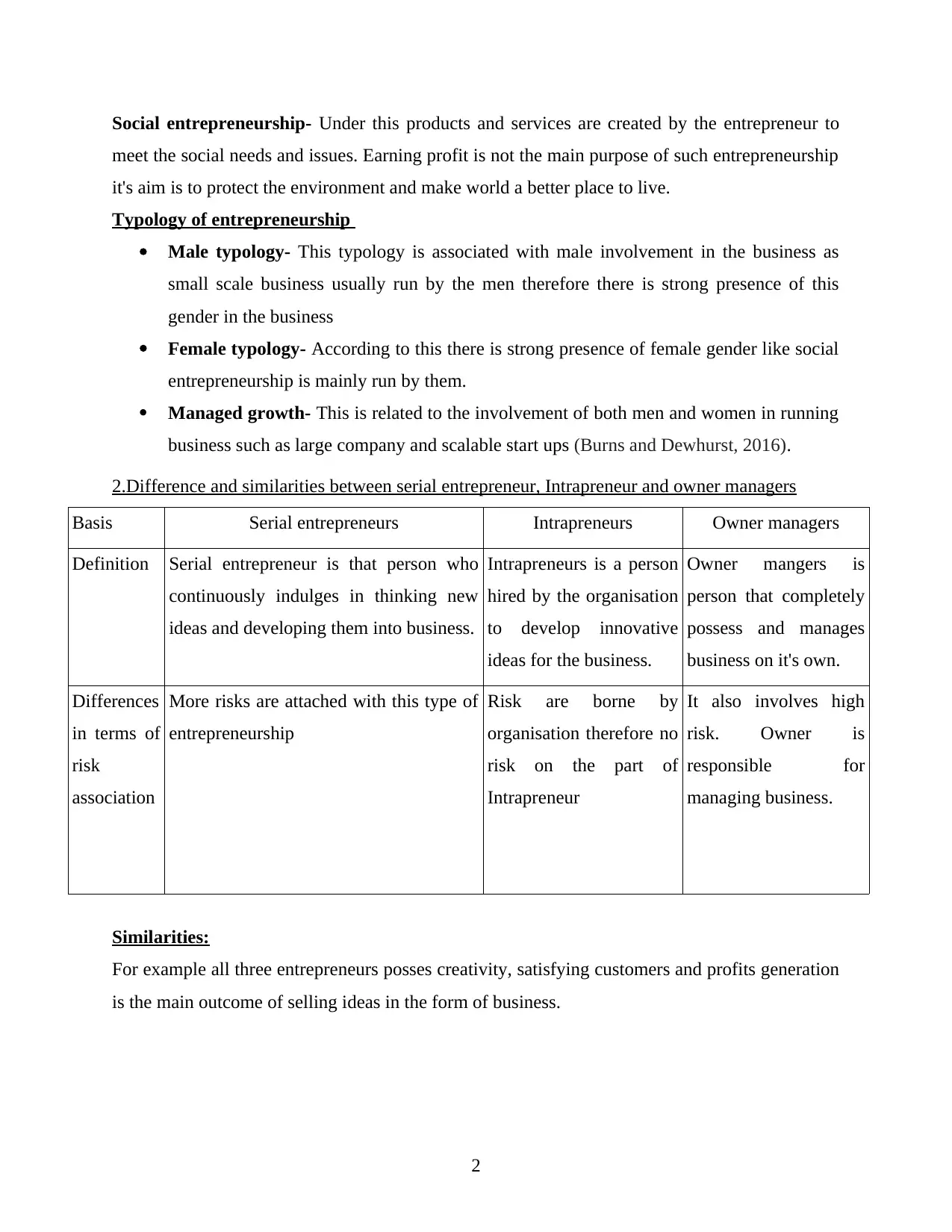
Social entrepreneurship- Under this products and services are created by the entrepreneur to
meet the social needs and issues. Earning profit is not the main purpose of such entrepreneurship
it's aim is to protect the environment and make world a better place to live.
Typology of entrepreneurship
Male typology- This typology is associated with male involvement in the business as
small scale business usually run by the men therefore there is strong presence of this
gender in the business
Female typology- According to this there is strong presence of female gender like social
entrepreneurship is mainly run by them.
Managed growth- This is related to the involvement of both men and women in running
business such as large company and scalable start ups (Burns and Dewhurst, 2016).
2.Difference and similarities between serial entrepreneur, Intrapreneur and owner managers
Basis Serial entrepreneurs Intrapreneurs Owner managers
Definition Serial entrepreneur is that person who
continuously indulges in thinking new
ideas and developing them into business.
Intrapreneurs is a person
hired by the organisation
to develop innovative
ideas for the business.
Owner mangers is
person that completely
possess and manages
business on it's own.
Differences
in terms of
risk
association
More risks are attached with this type of
entrepreneurship
Risk are borne by
organisation therefore no
risk on the part of
Intrapreneur
It also involves high
risk. Owner is
responsible for
managing business.
Similarities:
For example all three entrepreneurs posses creativity, satisfying customers and profits generation
is the main outcome of selling ideas in the form of business.
2
meet the social needs and issues. Earning profit is not the main purpose of such entrepreneurship
it's aim is to protect the environment and make world a better place to live.
Typology of entrepreneurship
Male typology- This typology is associated with male involvement in the business as
small scale business usually run by the men therefore there is strong presence of this
gender in the business
Female typology- According to this there is strong presence of female gender like social
entrepreneurship is mainly run by them.
Managed growth- This is related to the involvement of both men and women in running
business such as large company and scalable start ups (Burns and Dewhurst, 2016).
2.Difference and similarities between serial entrepreneur, Intrapreneur and owner managers
Basis Serial entrepreneurs Intrapreneurs Owner managers
Definition Serial entrepreneur is that person who
continuously indulges in thinking new
ideas and developing them into business.
Intrapreneurs is a person
hired by the organisation
to develop innovative
ideas for the business.
Owner mangers is
person that completely
possess and manages
business on it's own.
Differences
in terms of
risk
association
More risks are attached with this type of
entrepreneurship
Risk are borne by
organisation therefore no
risk on the part of
Intrapreneur
It also involves high
risk. Owner is
responsible for
managing business.
Similarities:
For example all three entrepreneurs posses creativity, satisfying customers and profits generation
is the main outcome of selling ideas in the form of business.
2
Paraphrase This Document
Need a fresh take? Get an instant paraphrase of this document with our AI Paraphraser
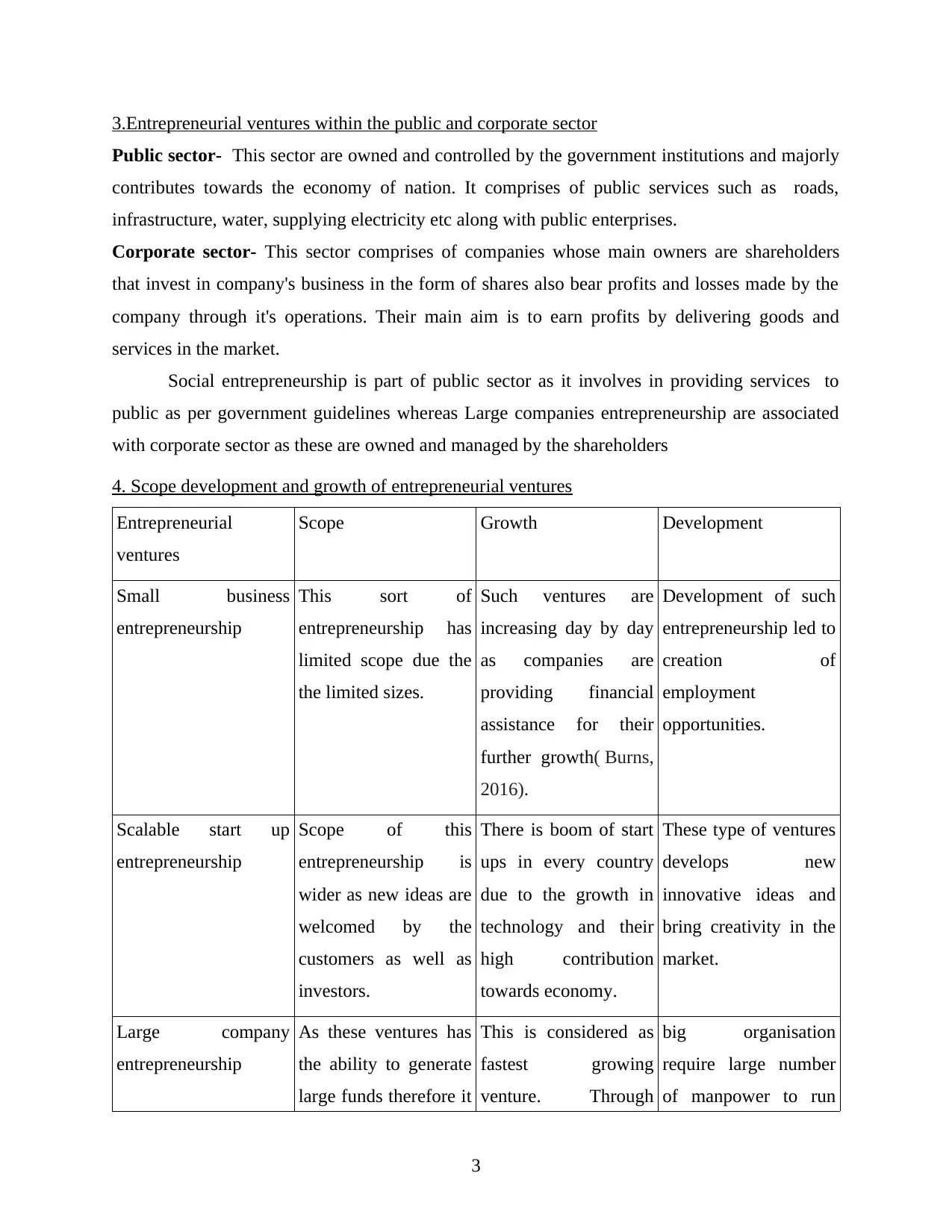
3.Entrepreneurial ventures within the public and corporate sector
Public sector- This sector are owned and controlled by the government institutions and majorly
contributes towards the economy of nation. It comprises of public services such as roads,
infrastructure, water, supplying electricity etc along with public enterprises.
Corporate sector- This sector comprises of companies whose main owners are shareholders
that invest in company's business in the form of shares also bear profits and losses made by the
company through it's operations. Their main aim is to earn profits by delivering goods and
services in the market.
Social entrepreneurship is part of public sector as it involves in providing services to
public as per government guidelines whereas Large companies entrepreneurship are associated
with corporate sector as these are owned and managed by the shareholders
4. Scope development and growth of entrepreneurial ventures
Entrepreneurial
ventures
Scope Growth Development
Small business
entrepreneurship
This sort of
entrepreneurship has
limited scope due the
the limited sizes.
Such ventures are
increasing day by day
as companies are
providing financial
assistance for their
further growth( Burns,
2016).
Development of such
entrepreneurship led to
creation of
employment
opportunities.
Scalable start up
entrepreneurship
Scope of this
entrepreneurship is
wider as new ideas are
welcomed by the
customers as well as
investors.
There is boom of start
ups in every country
due to the growth in
technology and their
high contribution
towards economy.
These type of ventures
develops new
innovative ideas and
bring creativity in the
market.
Large company
entrepreneurship
As these ventures has
the ability to generate
large funds therefore it
This is considered as
fastest growing
venture. Through
big organisation
require large number
of manpower to run
3
Public sector- This sector are owned and controlled by the government institutions and majorly
contributes towards the economy of nation. It comprises of public services such as roads,
infrastructure, water, supplying electricity etc along with public enterprises.
Corporate sector- This sector comprises of companies whose main owners are shareholders
that invest in company's business in the form of shares also bear profits and losses made by the
company through it's operations. Their main aim is to earn profits by delivering goods and
services in the market.
Social entrepreneurship is part of public sector as it involves in providing services to
public as per government guidelines whereas Large companies entrepreneurship are associated
with corporate sector as these are owned and managed by the shareholders
4. Scope development and growth of entrepreneurial ventures
Entrepreneurial
ventures
Scope Growth Development
Small business
entrepreneurship
This sort of
entrepreneurship has
limited scope due the
the limited sizes.
Such ventures are
increasing day by day
as companies are
providing financial
assistance for their
further growth( Burns,
2016).
Development of such
entrepreneurship led to
creation of
employment
opportunities.
Scalable start up
entrepreneurship
Scope of this
entrepreneurship is
wider as new ideas are
welcomed by the
customers as well as
investors.
There is boom of start
ups in every country
due to the growth in
technology and their
high contribution
towards economy.
These type of ventures
develops new
innovative ideas and
bring creativity in the
market.
Large company
entrepreneurship
As these ventures has
the ability to generate
large funds therefore it
This is considered as
fastest growing
venture. Through
big organisation
require large number
of manpower to run
3
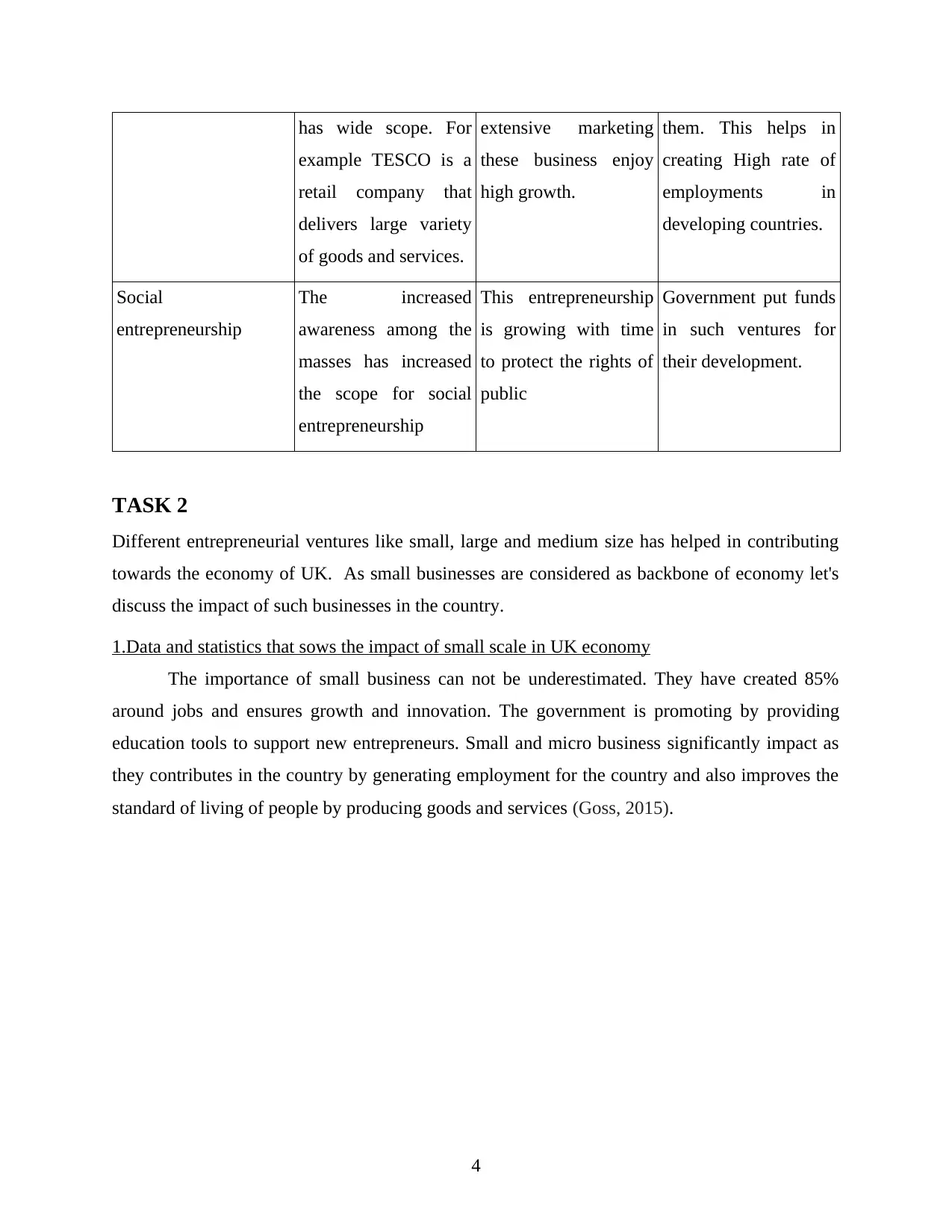
has wide scope. For
example TESCO is a
retail company that
delivers large variety
of goods and services.
extensive marketing
these business enjoy
high growth.
them. This helps in
creating High rate of
employments in
developing countries.
Social
entrepreneurship
The increased
awareness among the
masses has increased
the scope for social
entrepreneurship
This entrepreneurship
is growing with time
to protect the rights of
public
Government put funds
in such ventures for
their development.
TASK 2
Different entrepreneurial ventures like small, large and medium size has helped in contributing
towards the economy of UK. As small businesses are considered as backbone of economy let's
discuss the impact of such businesses in the country.
1.Data and statistics that sows the impact of small scale in UK economy
The importance of small business can not be underestimated. They have created 85%
around jobs and ensures growth and innovation. The government is promoting by providing
education tools to support new entrepreneurs. Small and micro business significantly impact as
they contributes in the country by generating employment for the country and also improves the
standard of living of people by producing goods and services (Goss, 2015).
4
example TESCO is a
retail company that
delivers large variety
of goods and services.
extensive marketing
these business enjoy
high growth.
them. This helps in
creating High rate of
employments in
developing countries.
Social
entrepreneurship
The increased
awareness among the
masses has increased
the scope for social
entrepreneurship
This entrepreneurship
is growing with time
to protect the rights of
public
Government put funds
in such ventures for
their development.
TASK 2
Different entrepreneurial ventures like small, large and medium size has helped in contributing
towards the economy of UK. As small businesses are considered as backbone of economy let's
discuss the impact of such businesses in the country.
1.Data and statistics that sows the impact of small scale in UK economy
The importance of small business can not be underestimated. They have created 85%
around jobs and ensures growth and innovation. The government is promoting by providing
education tools to support new entrepreneurs. Small and micro business significantly impact as
they contributes in the country by generating employment for the country and also improves the
standard of living of people by producing goods and services (Goss, 2015).
4
⊘ This is a preview!⊘
Do you want full access?
Subscribe today to unlock all pages.

Trusted by 1+ million students worldwide
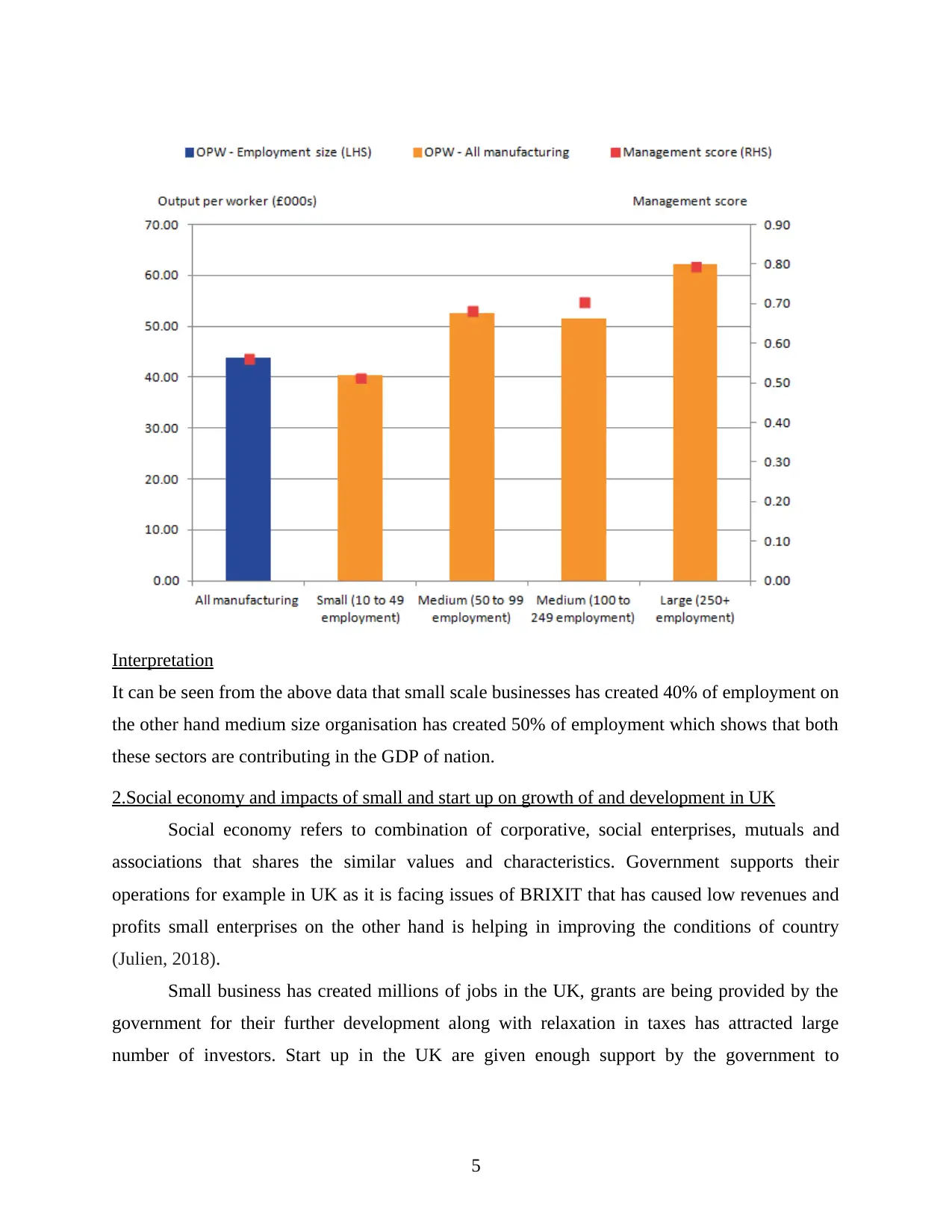
Interpretation
It can be seen from the above data that small scale businesses has created 40% of employment on
the other hand medium size organisation has created 50% of employment which shows that both
these sectors are contributing in the GDP of nation.
2.Social economy and impacts of small and start up on growth of and development in UK
Social economy refers to combination of corporative, social enterprises, mutuals and
associations that shares the similar values and characteristics. Government supports their
operations for example in UK as it is facing issues of BRIXIT that has caused low revenues and
profits small enterprises on the other hand is helping in improving the conditions of country
(Julien, 2018).
Small business has created millions of jobs in the UK, grants are being provided by the
government for their further development along with relaxation in taxes has attracted large
number of investors. Start up in the UK are given enough support by the government to
5
It can be seen from the above data that small scale businesses has created 40% of employment on
the other hand medium size organisation has created 50% of employment which shows that both
these sectors are contributing in the GDP of nation.
2.Social economy and impacts of small and start up on growth of and development in UK
Social economy refers to combination of corporative, social enterprises, mutuals and
associations that shares the similar values and characteristics. Government supports their
operations for example in UK as it is facing issues of BRIXIT that has caused low revenues and
profits small enterprises on the other hand is helping in improving the conditions of country
(Julien, 2018).
Small business has created millions of jobs in the UK, grants are being provided by the
government for their further development along with relaxation in taxes has attracted large
number of investors. Start up in the UK are given enough support by the government to
5
Paraphrase This Document
Need a fresh take? Get an instant paraphrase of this document with our AI Paraphraser
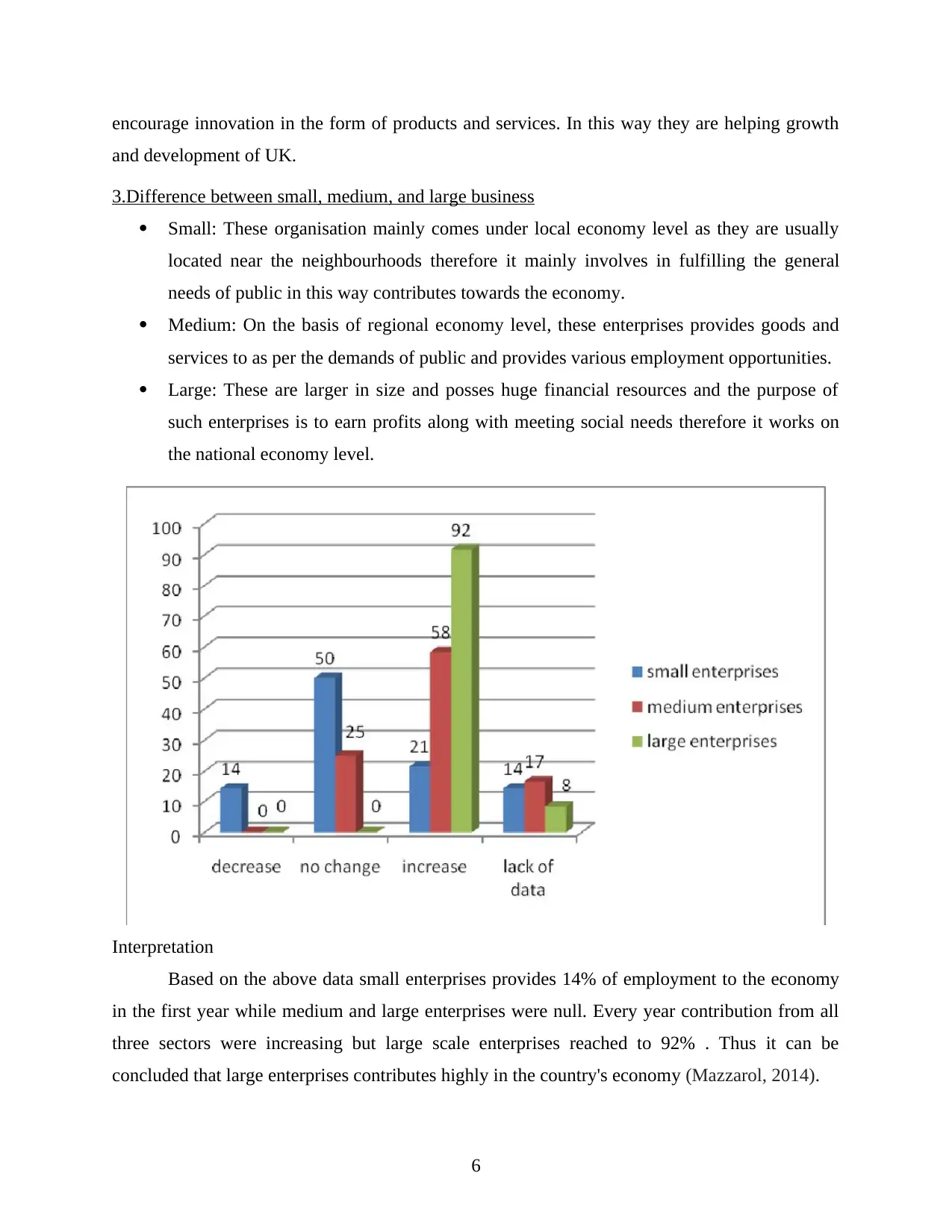
encourage innovation in the form of products and services. In this way they are helping growth
and development of UK.
3.Difference between small, medium, and large business
Small: These organisation mainly comes under local economy level as they are usually
located near the neighbourhoods therefore it mainly involves in fulfilling the general
needs of public in this way contributes towards the economy.
Medium: On the basis of regional economy level, these enterprises provides goods and
services to as per the demands of public and provides various employment opportunities.
Large: These are larger in size and posses huge financial resources and the purpose of
such enterprises is to earn profits along with meeting social needs therefore it works on
the national economy level.
Interpretation
Based on the above data small enterprises provides 14% of employment to the economy
in the first year while medium and large enterprises were null. Every year contribution from all
three sectors were increasing but large scale enterprises reached to 92% . Thus it can be
concluded that large enterprises contributes highly in the country's economy (Mazzarol, 2014).
6
and development of UK.
3.Difference between small, medium, and large business
Small: These organisation mainly comes under local economy level as they are usually
located near the neighbourhoods therefore it mainly involves in fulfilling the general
needs of public in this way contributes towards the economy.
Medium: On the basis of regional economy level, these enterprises provides goods and
services to as per the demands of public and provides various employment opportunities.
Large: These are larger in size and posses huge financial resources and the purpose of
such enterprises is to earn profits along with meeting social needs therefore it works on
the national economy level.
Interpretation
Based on the above data small enterprises provides 14% of employment to the economy
in the first year while medium and large enterprises were null. Every year contribution from all
three sectors were increasing but large scale enterprises reached to 92% . Thus it can be
concluded that large enterprises contributes highly in the country's economy (Mazzarol, 2014).
6
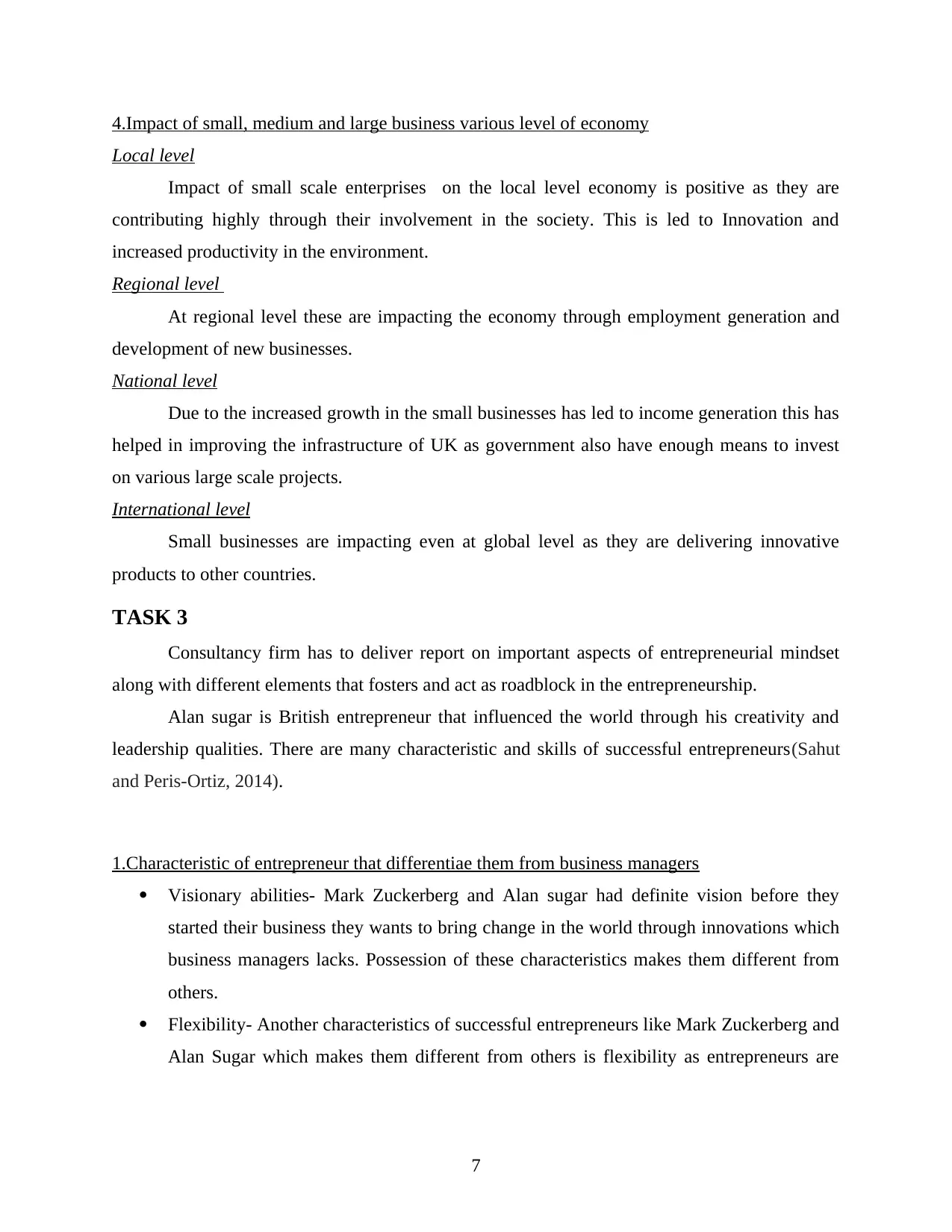
4.Impact of small, medium and large business various level of economy
Local level
Impact of small scale enterprises on the local level economy is positive as they are
contributing highly through their involvement in the society. This is led to Innovation and
increased productivity in the environment.
Regional level
At regional level these are impacting the economy through employment generation and
development of new businesses.
National level
Due to the increased growth in the small businesses has led to income generation this has
helped in improving the infrastructure of UK as government also have enough means to invest
on various large scale projects.
International level
Small businesses are impacting even at global level as they are delivering innovative
products to other countries.
TASK 3
Consultancy firm has to deliver report on important aspects of entrepreneurial mindset
along with different elements that fosters and act as roadblock in the entrepreneurship.
Alan sugar is British entrepreneur that influenced the world through his creativity and
leadership qualities. There are many characteristic and skills of successful entrepreneurs(Sahut
and Peris-Ortiz, 2014).
1.Characteristic of entrepreneur that differentiae them from business managers
Visionary abilities- Mark Zuckerberg and Alan sugar had definite vision before they
started their business they wants to bring change in the world through innovations which
business managers lacks. Possession of these characteristics makes them different from
others.
Flexibility- Another characteristics of successful entrepreneurs like Mark Zuckerberg and
Alan Sugar which makes them different from others is flexibility as entrepreneurs are
7
Local level
Impact of small scale enterprises on the local level economy is positive as they are
contributing highly through their involvement in the society. This is led to Innovation and
increased productivity in the environment.
Regional level
At regional level these are impacting the economy through employment generation and
development of new businesses.
National level
Due to the increased growth in the small businesses has led to income generation this has
helped in improving the infrastructure of UK as government also have enough means to invest
on various large scale projects.
International level
Small businesses are impacting even at global level as they are delivering innovative
products to other countries.
TASK 3
Consultancy firm has to deliver report on important aspects of entrepreneurial mindset
along with different elements that fosters and act as roadblock in the entrepreneurship.
Alan sugar is British entrepreneur that influenced the world through his creativity and
leadership qualities. There are many characteristic and skills of successful entrepreneurs(Sahut
and Peris-Ortiz, 2014).
1.Characteristic of entrepreneur that differentiae them from business managers
Visionary abilities- Mark Zuckerberg and Alan sugar had definite vision before they
started their business they wants to bring change in the world through innovations which
business managers lacks. Possession of these characteristics makes them different from
others.
Flexibility- Another characteristics of successful entrepreneurs like Mark Zuckerberg and
Alan Sugar which makes them different from others is flexibility as entrepreneurs are
7
⊘ This is a preview!⊘
Do you want full access?
Subscribe today to unlock all pages.

Trusted by 1+ million students worldwide
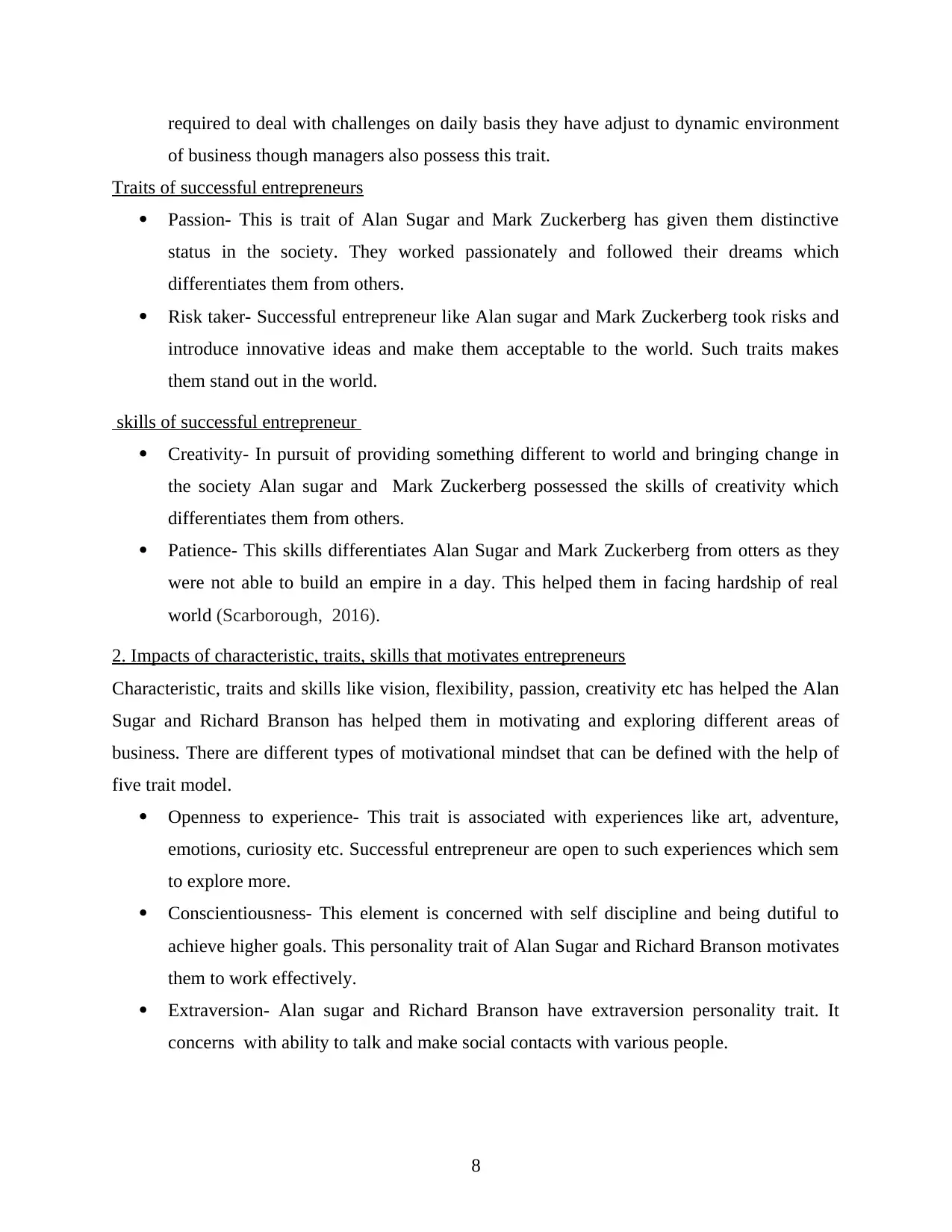
required to deal with challenges on daily basis they have adjust to dynamic environment
of business though managers also possess this trait.
Traits of successful entrepreneurs
Passion- This is trait of Alan Sugar and Mark Zuckerberg has given them distinctive
status in the society. They worked passionately and followed their dreams which
differentiates them from others.
Risk taker- Successful entrepreneur like Alan sugar and Mark Zuckerberg took risks and
introduce innovative ideas and make them acceptable to the world. Such traits makes
them stand out in the world.
skills of successful entrepreneur
Creativity- In pursuit of providing something different to world and bringing change in
the society Alan sugar and Mark Zuckerberg possessed the skills of creativity which
differentiates them from others.
Patience- This skills differentiates Alan Sugar and Mark Zuckerberg from otters as they
were not able to build an empire in a day. This helped them in facing hardship of real
world (Scarborough, 2016).
2. Impacts of characteristic, traits, skills that motivates entrepreneurs
Characteristic, traits and skills like vision, flexibility, passion, creativity etc has helped the Alan
Sugar and Richard Branson has helped them in motivating and exploring different areas of
business. There are different types of motivational mindset that can be defined with the help of
five trait model.
Openness to experience- This trait is associated with experiences like art, adventure,
emotions, curiosity etc. Successful entrepreneur are open to such experiences which sem
to explore more.
Conscientiousness- This element is concerned with self discipline and being dutiful to
achieve higher goals. This personality trait of Alan Sugar and Richard Branson motivates
them to work effectively.
Extraversion- Alan sugar and Richard Branson have extraversion personality trait. It
concerns with ability to talk and make social contacts with various people.
8
of business though managers also possess this trait.
Traits of successful entrepreneurs
Passion- This is trait of Alan Sugar and Mark Zuckerberg has given them distinctive
status in the society. They worked passionately and followed their dreams which
differentiates them from others.
Risk taker- Successful entrepreneur like Alan sugar and Mark Zuckerberg took risks and
introduce innovative ideas and make them acceptable to the world. Such traits makes
them stand out in the world.
skills of successful entrepreneur
Creativity- In pursuit of providing something different to world and bringing change in
the society Alan sugar and Mark Zuckerberg possessed the skills of creativity which
differentiates them from others.
Patience- This skills differentiates Alan Sugar and Mark Zuckerberg from otters as they
were not able to build an empire in a day. This helped them in facing hardship of real
world (Scarborough, 2016).
2. Impacts of characteristic, traits, skills that motivates entrepreneurs
Characteristic, traits and skills like vision, flexibility, passion, creativity etc has helped the Alan
Sugar and Richard Branson has helped them in motivating and exploring different areas of
business. There are different types of motivational mindset that can be defined with the help of
five trait model.
Openness to experience- This trait is associated with experiences like art, adventure,
emotions, curiosity etc. Successful entrepreneur are open to such experiences which sem
to explore more.
Conscientiousness- This element is concerned with self discipline and being dutiful to
achieve higher goals. This personality trait of Alan Sugar and Richard Branson motivates
them to work effectively.
Extraversion- Alan sugar and Richard Branson have extraversion personality trait. It
concerns with ability to talk and make social contacts with various people.
8
Paraphrase This Document
Need a fresh take? Get an instant paraphrase of this document with our AI Paraphraser
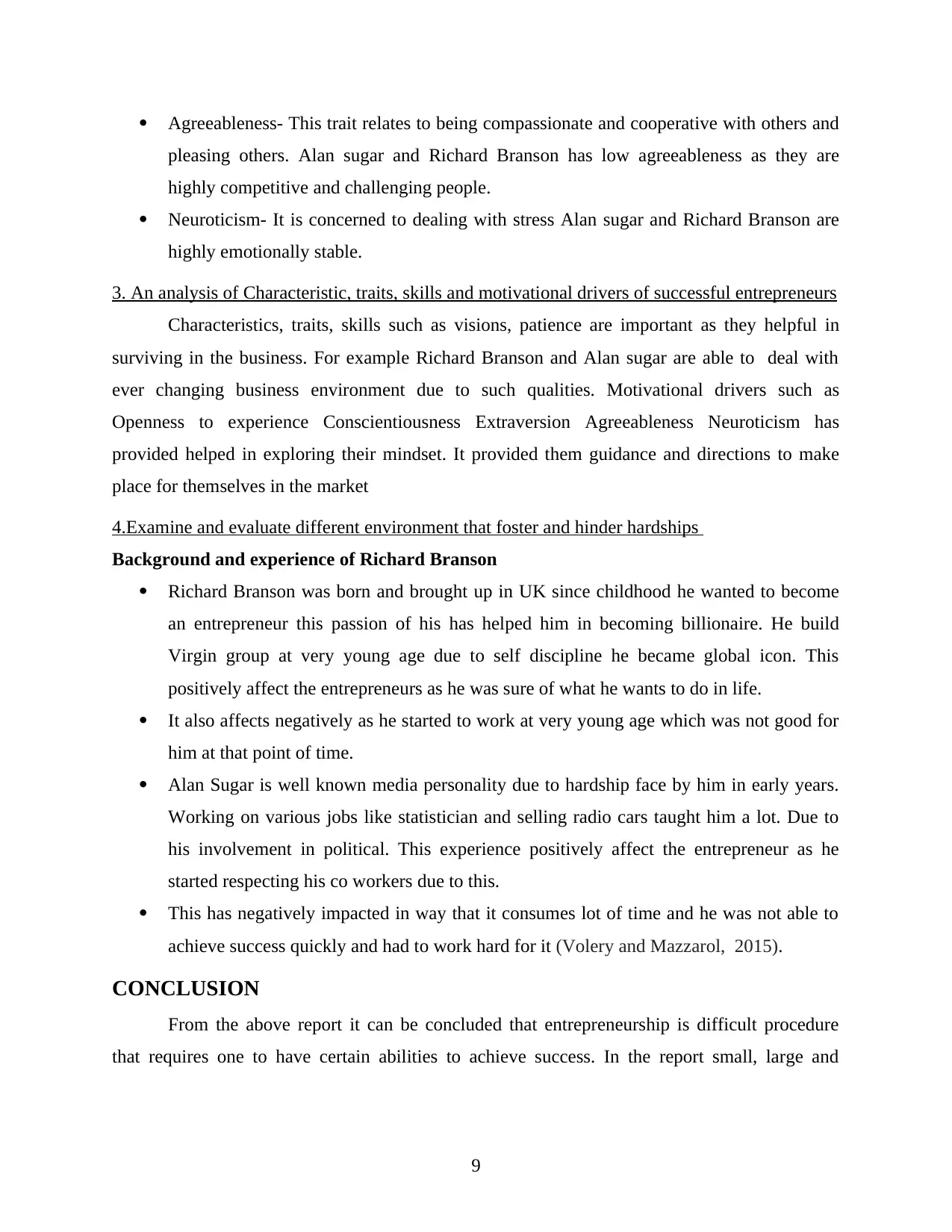
Agreeableness- This trait relates to being compassionate and cooperative with others and
pleasing others. Alan sugar and Richard Branson has low agreeableness as they are
highly competitive and challenging people.
Neuroticism- It is concerned to dealing with stress Alan sugar and Richard Branson are
highly emotionally stable.
3. An analysis of Characteristic, traits, skills and motivational drivers of successful entrepreneurs
Characteristics, traits, skills such as visions, patience are important as they helpful in
surviving in the business. For example Richard Branson and Alan sugar are able to deal with
ever changing business environment due to such qualities. Motivational drivers such as
Openness to experience Conscientiousness Extraversion Agreeableness Neuroticism has
provided helped in exploring their mindset. It provided them guidance and directions to make
place for themselves in the market
4.Examine and evaluate different environment that foster and hinder hardships
Background and experience of Richard Branson
Richard Branson was born and brought up in UK since childhood he wanted to become
an entrepreneur this passion of his has helped him in becoming billionaire. He build
Virgin group at very young age due to self discipline he became global icon. This
positively affect the entrepreneurs as he was sure of what he wants to do in life.
It also affects negatively as he started to work at very young age which was not good for
him at that point of time.
Alan Sugar is well known media personality due to hardship face by him in early years.
Working on various jobs like statistician and selling radio cars taught him a lot. Due to
his involvement in political. This experience positively affect the entrepreneur as he
started respecting his co workers due to this.
This has negatively impacted in way that it consumes lot of time and he was not able to
achieve success quickly and had to work hard for it (Volery and Mazzarol, 2015).
CONCLUSION
From the above report it can be concluded that entrepreneurship is difficult procedure
that requires one to have certain abilities to achieve success. In the report small, large and
9
pleasing others. Alan sugar and Richard Branson has low agreeableness as they are
highly competitive and challenging people.
Neuroticism- It is concerned to dealing with stress Alan sugar and Richard Branson are
highly emotionally stable.
3. An analysis of Characteristic, traits, skills and motivational drivers of successful entrepreneurs
Characteristics, traits, skills such as visions, patience are important as they helpful in
surviving in the business. For example Richard Branson and Alan sugar are able to deal with
ever changing business environment due to such qualities. Motivational drivers such as
Openness to experience Conscientiousness Extraversion Agreeableness Neuroticism has
provided helped in exploring their mindset. It provided them guidance and directions to make
place for themselves in the market
4.Examine and evaluate different environment that foster and hinder hardships
Background and experience of Richard Branson
Richard Branson was born and brought up in UK since childhood he wanted to become
an entrepreneur this passion of his has helped him in becoming billionaire. He build
Virgin group at very young age due to self discipline he became global icon. This
positively affect the entrepreneurs as he was sure of what he wants to do in life.
It also affects negatively as he started to work at very young age which was not good for
him at that point of time.
Alan Sugar is well known media personality due to hardship face by him in early years.
Working on various jobs like statistician and selling radio cars taught him a lot. Due to
his involvement in political. This experience positively affect the entrepreneur as he
started respecting his co workers due to this.
This has negatively impacted in way that it consumes lot of time and he was not able to
achieve success quickly and had to work hard for it (Volery and Mazzarol, 2015).
CONCLUSION
From the above report it can be concluded that entrepreneurship is difficult procedure
that requires one to have certain abilities to achieve success. In the report small, large and
9

medium scale businesses and their significant impacts on businesses has also been discussed.
Each of these sectors contribute towards the growth of economy.
10
Each of these sectors contribute towards the growth of economy.
10
⊘ This is a preview!⊘
Do you want full access?
Subscribe today to unlock all pages.

Trusted by 1+ million students worldwide
1 out of 14
Related Documents
Your All-in-One AI-Powered Toolkit for Academic Success.
+13062052269
info@desklib.com
Available 24*7 on WhatsApp / Email
![[object Object]](/_next/static/media/star-bottom.7253800d.svg)
Unlock your academic potential
Copyright © 2020–2026 A2Z Services. All Rights Reserved. Developed and managed by ZUCOL.




